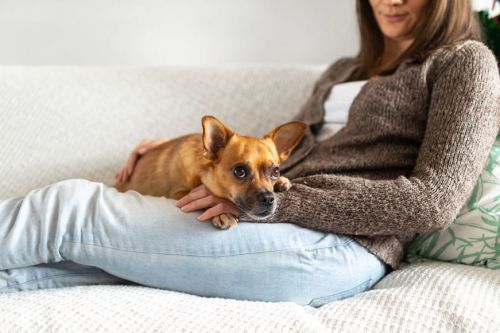Pets can definitely handle CBD, but here’s what you need to know before dosing yours
CBD has become a popular and buzzy ingredient, but before you use CBD for animals or pets these are the most important things you should know.

These days CBD is found pretty much everywhere, in basically everything. For a short while, CBD was a common ingredient in foods at cafes and restaurants. You can still find it in snacks, lip glosses, and even lube. The purported benefits of CBD—namely that it calms anxiety, relieves stress, and helps with pain—have made it a very popular within the wellness community. And now CBD for animals is going mainstream with the introduction of a new line of products backed by Martha Stewart.
Before you start dosing your pup with CBD, there are a few things you should know about how the stuff will affect your furry friend. According to the American Society for the Prevention of Cruelty to Animals (ASPCA), it’s quite possible for pets to overdose on CBD products, resulting in symptoms similar to those of a THC overdose Be sure to keep those treats stored out of reach! While the ASPCA notes that few studies have been conducted regarding the safety of CBD for animals, here’s what you need to know about the cannabis byproduct and how your pet will tolerate it.
1. Animals have an endocannabinoid system
In humans, CBD interacts with the endocannabinoid system (ECS), which runs through your nervous system, organs, tissue, glands, and immune system. When humans take CBD it can allegedly help rebalance the body’s homeostasis which is disrupted by all things bad for you (diet, stress, etc).
“Like humans, animals have an endocannabinoid system that is used to regulate their body,”says Ian Quinn, CEO of Phyto Animal Health. “Unlike THC, which in high quantities can be toxic to animals, CBD is nonpsychoactive and won’t make them high.”
2. Studies have found CBD to be helpful for animals
“CBD hemp oil has been researched by top veterinarians for cardiovascular, pain management, orthopedic, and mental health in animals,” Quinn says. One study found that CBD reduced psychotic behavior when used on animals, while another study found it to have a noticeable impact on pain reduction.
3. Consider the size of your pet
“Pet owners should always follow the advice to start slow,” Quinn says. You should also speak to a veterinarian or an expert since “the amount of CBD needed for each pet depends on their weight.” Certain CBD products marketed specifically for animals may have instructions and outline the appropriate dosage for your specific pet and pet size.
4. When in doubt, ask for a certificate of analysis
Animals and humans can use the same CBD products so a good rule of thumb is not to give your pet a CBD oil or product you wouldn’t take yourself. “Find a reputable company and do some research first—starting with acquiring a certificate of analysis (COA) from the manufacturer, which will prove that the product contains what it claims on the label,” Quinn says. “You want to make sure that your CBD oil is abundant in CBD and low in THC, or in some cases, doesn’t have any THC at all.”
When you’re looking for CBD make sure you don’t get it confused with hemp oil and that you know how it can interact with your anxiety.
Sign Up for Our Daily Newsletter
Get all the latest in wellness, trends, food, fitness, beauty, and more delivered right to your inbox.
Got it, you've been added to our email list.










